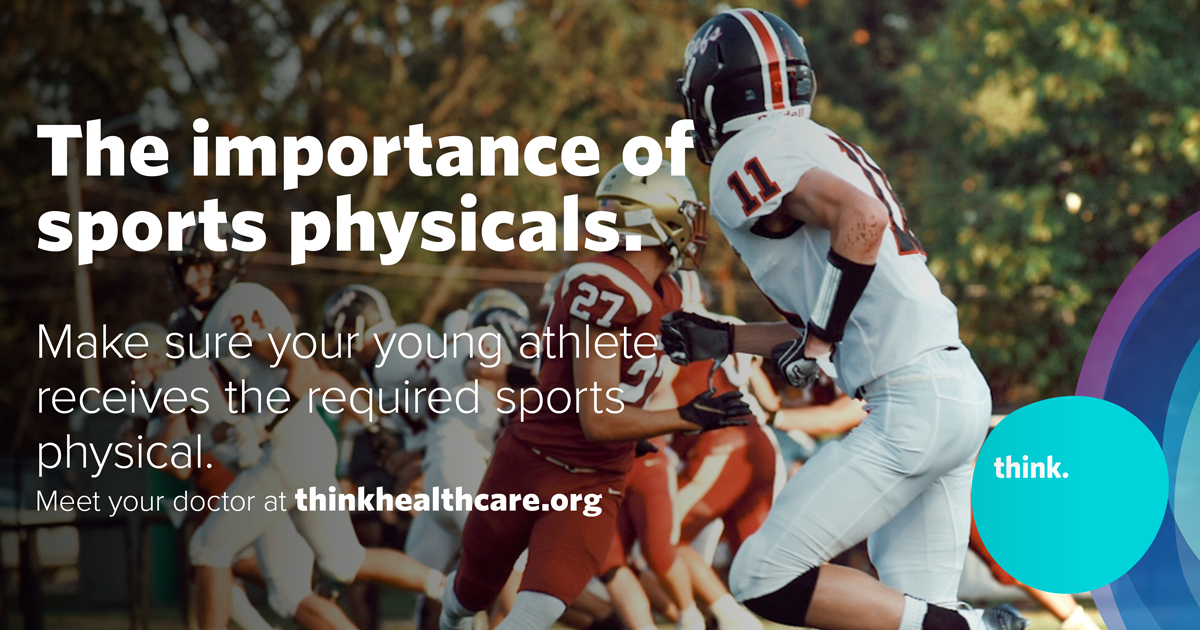Football, volleyball, soccer, baseball, track. Kids and teens today can select from a variety of school and community sports and activities year-round. But before young athletes report for their first practice, most schools, local sports programs and state regulations require sports physicals, also known as a pre-participation physical examination. These exams are conducted by a physician and are required once a year or before participating in any physical activity at school, camp or another community organization.
A sports physical helps ensure that the young athlete is healthy and physically able to join in the conditioning and challenges of their chosen sport. Pre-screening young people before they play sports helps reduce the risk of injuries and may catch other health problems that need attention.
What Happens During a Sports Physical Exam?
Depending on the school or sport governing body, the medical requirements for a sports physical may vary slightly, but the following are common components of an exam.
- Height and weight measurement
- Check of heart rate and rhythm, blood pressure and oxygen saturation
- Overall check of heart, lungs, abdomen, ears, nose and throat
- Check of vision sharpness and clarity from a distance
- Evaluation of strength, flexibility, posture and joints
- Review of immunizations, medications and supplements
- Review of athlete’s and family’s medical history
- Urine screening
Benefits Sports Physicals
The medical exam helps protect the athlete, teammates, staff and opposing team athletes from avoidable illnesses, injuries and possible life-threatening conditions. Sports physicals catch more than muscle and joint or breathing problems. A complete sports physical screens for any current or pre-existing conditions and family medical history that can lead to compromised health, pain or injury for the athlete.
The thorough exam and conversation with the doctor are also a convenient way to gain training advice and techniques to help avoid injury before, during and after games and from other physical activities.
What to Bring to a Sports Physical
The athlete’s parents or guardians will need to complete their section of necessary forms before the exam. The athlete will need to bring the following to the sports physical appointment:
- Pertinent health and medical history including a list of current medical conditions and medications for such conditions such as allergies and asthma
- Evaluation statement by a primary care provider or treating physician for any youth who has experienced a heart ailment or cardiac event
- Primary care provider contact information
What to Expect After a Sports Physical
Your think healthcare provider will determine if it is safe for your child to participate in sports. The athlete may be fully cleared for sport activities or given a health restriction such as the need to wear glasses when playing sports.
Your think physician will also complete and sign the required sports physical form with notes about your child’s current health, special requirements to play sports and any conditions that might lead to a higher risk of injury. You will submit the sports physical form the appropriate school representative, coach or athletic trainer.
How to Prevent Sports Injuries in Children
Physical activity for babies through adolescents is important for normal growth and development. When exercise or physical activity becomes too intense or too frequent in a short amount of time, this can breakdown tissues in the body and cause painful injury. Youth sports injuries range from sprained ankles and repetitive motion strains to broken bones and concussions. Certain risk factors can add to possible injuries for young athletes including:
- Pre-existing health conditions
- Anatomic malalignment
- Improper footwear or protective gear
- Intensive, repetitive training during growth periods
- Imbalance of strength or joint range of motion exercises
- Poor nutrition and hydration
A sports physical for kids and teens is not intended to replace a comprehensive annual exam, scheduled vaccinations or regular health screenings.
Where to Go for your Sports Physicals
Think makes it easy to get a sports physical for young athletes. Our experienced team of physicians and clinicians are available every day of the week: Monday – Friday, 7 a.m.-8 p.m. and Saturday – Sunday, 9 a.m.-5 p.m. Please call 402-506-9049 to book an appointment with a Think Whole Person Healthcare physician or schedule an appointment online.
To learn more about our wide-ranging healthcare services, visit our Services page online and choose your own think medical professionals by visiting our Meet Your Doctor page.
